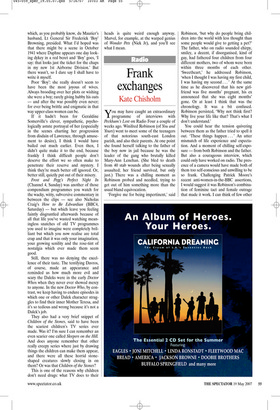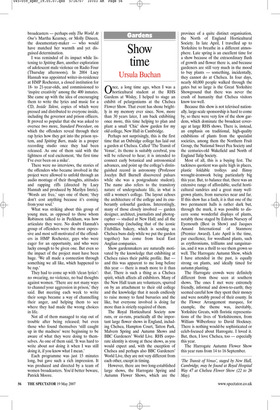Frank exchanges
Kate Chisholm
You may have caught an extraordinary programme of interviews with Peckham’s Lost on Radio Four a couple of weeks ago. Winifred Robinson (of You and Yours) went to meet some of the teenagers of that notorious south-east London parish, and also their parents. At one point she found herself talking to the father of the boy now in jail because he was the leader of the gang who brutally killed Mary-Ann Lenehan. (She bled to death from 40 stab wounds after being sexually assaulted; her friend survived, but only just.) There was a chilling moment as Robinson probed and needled, trying to get out of him something more than the usual bland equivocation.
‘Forgive me for being impertinent,’ said Robinson, ‘but why do people bring children into the world with less thought than some people would give to getting a pet?’ The father, who on radio sounded chirpy, smiley, a decent, if disorganised, kind of guy, had fathered four children from four different mothers, two of whom were born within three months of each other. ‘Sweetheart,’ he addressed Robinson, ‘when I thought I was having my first child, I was having my second ... ’ At the same time as he discovered that his new girlfriend was five months’ pregnant, his ex announced that she was eight months’ gone. Or at least I think that was the chronology. It was a bit confused. Robinson persisted, ‘Why not think first? Why live your life like that? That’s what I don’t understand.’ You could hear the tension quivering between them as the father tried to spell it out. ‘These things happen ... ’ An utter mismatch of life experience and expectation. And a moment of chilling self-exposure — from both Robinson and the father. But also a courageous interview, which could only have worked on radio. The presence of a camera would have made both of them too self-conscious and unwilling to be so frank. Challenging Patrick Moore’s recent anti-women-in-the-BBC assertions, I would suggest it was Robinson’s combination of feminine tact and female outrage that made it work. I can think of few other broadcasters — perhaps only The World At One’s Martha Kearney, or Molly Dineen, the documentary-maker — who would have matched her warmth and yet disguised determination.
I was reminded of its impact while listening to Spitting Bars, another exploration of adolescent male violence on Radio Four (Thursday afternoons). In 2004 Lucy Hannah was appointed writer-in-residence at HMP Rochester, a closed institution for 18to 21-year-olds, and commissioned to ‘inspire creativity’ among the 400 inmates. She came up with the idea of encouraging them to write the lyrics and music for a CD, Inside Talent, copies of which were pressed and distributed to everyone inside, including the governor and prison officers. It proved so popular that she was asked to oversee two more, Standard Procedure, on which the offenders reveal through their rap lyrics how they got into the prison system, and Spitting Bars, made in a proper recording studio once they had been released. As one of them said with the lightness of real excitement, ‘the first time I’ve ever been on a mike’.
There were no interviews, the stories of the offenders who became involved in the project were allowed to unfold through an audio montage of their thoughts, attitudes and rapping riffs (directed by Lucy Hannah and produced by Marilyn Imrie). ‘Words are free,’ says one of them; ‘they don’t cost anything because it’s coming from your soul.’ What was striking about this group of young men, as opposed to those whom Robinson talked to in Peckham, was how articulate they were. No doubt Hannah’s group of offenders were the most expressive and most self-motivated of the offenders in HMP Rochester, guys who were eager for an opportunity, and who were lucky enough to be given one. But even so the impact of the project must have been huge. ‘We all made a connection through something we all like, which happened to be rap.’ They had to come up with ‘clean lyrics’: no swearing, no violence, no bad thoughts against women. ‘There are not many ways to channel your aggression in prison,’ they said. But meeting each week to write their songs became a way of channelling their anger, and helping them to see where they had made the wrong choices in life.
Not all of them managed to stay out of trouble after being released; but even those who found themselves ‘still caught up in the madness’ were beginning to be aware of what they were doing to themselves. As one of them said, ‘It was hard to write about not doing it when I was still doing it, if you know what I mean.’ Each programme was just 15 minutes long, but gave such a rich impression. It was produced and directed by a team of women broadcasters. You’d better beware, Patrick Moore.











































































 Previous page
Previous page